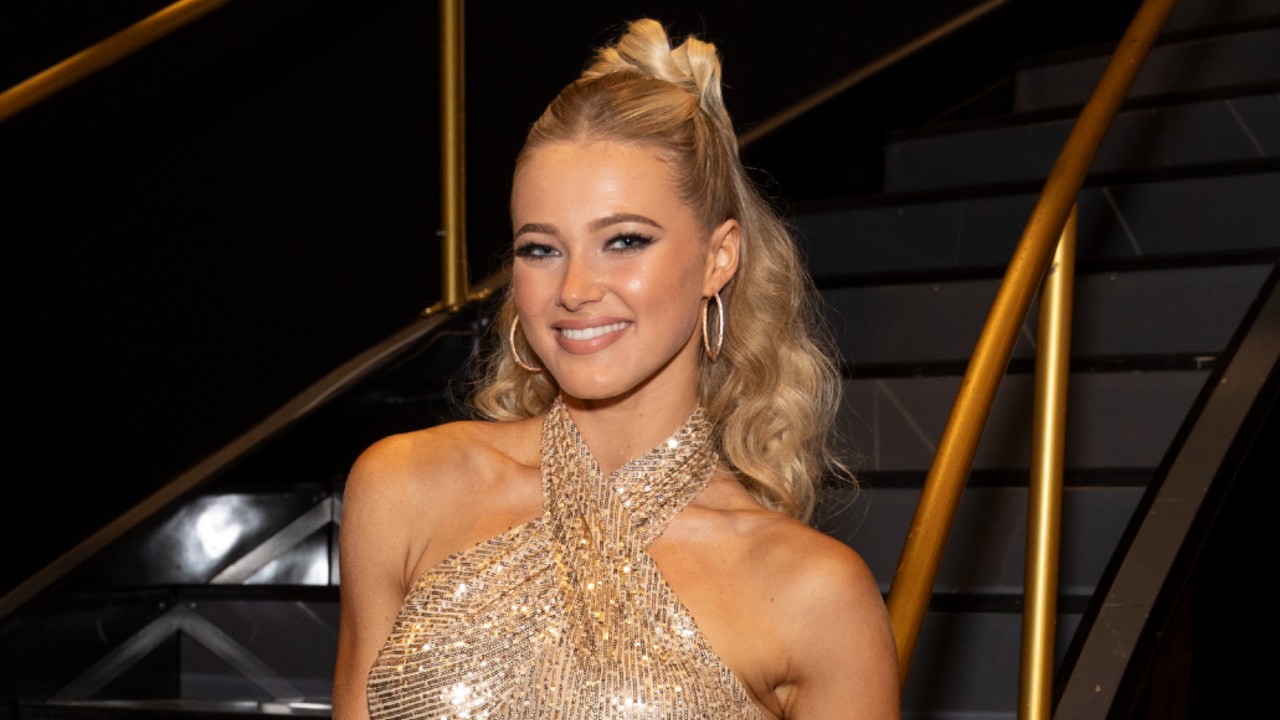Interview: Cowboys & Aliens' Daniel Craig
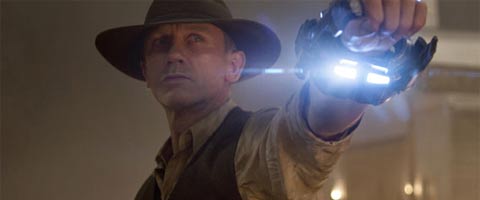
Your Daily Blend of Entertainment News
You are now subscribed
Your newsletter sign-up was successful
The western is one of the oldest traditions in the history of filmmaking. Going all the way back to the days of the Lumière brothers directors were going back into history and recreating the days of the old west on camera. Because of this some people might find it strange to see Daniel Craig, a British actor best known for his portrayal of James Bond, getting on a horse and riding out into the New Mexico desert in Cowboys & Aliens, but he makes it work.
Closing out my interviews from my time in Missoula, Montana, myself and a small group of other journalists recently had the chance to sit down with Craig to talk about his role in Jon Favreau’s new film. Check out the interview below in which the actor talks about his desire to do the project, what it was like working with the legendary Harrison Ford, and playing the strong silent type.
So you talked about being a fan of Butch Cassidy & The Sundance Kid and Aliens, and that was part of the appeal of doing this mash-up. Were there other films? Is that correct?
Well, kind of. I mean, I’m a fan of those movies, but that didn’t make me immediately kind-of go, “I want to do a movie about cowboys and aliens” [laughs]. I loved the fact that I got the script and it said Cowboys & Aliens, and I was like, “Oh okay, here we go.” And the movie actually took me somewhere else when I read it. And that’s hopefully what we tried to achieve here. There’s going to be preconceptions about the title, but actually we’ve done an authentic western and tried to bring, well there’s a great bunch of actors in this movie, but some real characters together that deal with this incredible thing. When the shit hits the fan, hopefully you’re caring about them.
When you’re developing your character in terms of you have no memory at first, and he sort of evolves over the time. In working with that, he has some eternal characteristics. He’s immediately ruthless. He’s willing to be, without hesitation, ruthless.
It’s instinctively ruthless. And that’s what I liked. In all good westerns, the good guy is always a little bit questionable because he kind-of has to make moral judgments. There’s an instinct within him, which is about survival and killing, I mean, let’s be honest. And during the movie, there’s a sort-of redemption about that. He wakes up for the first time through this awful experience. With Harrison’s character as well, he’s going through a sort-of redemptive process as well. That appealed to me, it gives it a few more levels and I kind of like bad guy, good guys. They’re kind-of the more interesting people.
On that same level, I know you’ve done it more directly with James Bond, but this type of character Jake is, is sort-of a trope unto itself for the western: the silent, strong type. And I’m curious, what the challenge was in trying to take a very familiar character that’s been played by many characters over the years and give it your own flavor to it?
Your Daily Blend of Entertainment News
I just wanted to play a cowboy for a long time. I don’t know really. I give it everything I could in the sense that I watched as many westerns as I could. I’ve always watched them. I’ve always seen them. You choose the costume, the chaps go on, the hat goes on, and you kind of just give it your all. I’m just lucky to be given the chance to do it, as far as I’m concerned.
Do you revert to a sense of childhood in playing cowboys and Indians?
I’ve always reverted to a sense of childhood, just in everyday life.
My favorite line in the film is yours and it’s just when you and Olivia crash that ship and you just look at her and go: “We were just flying.” That didn’t seem like, that was just you.
Again, the thing about combining the two things, you kind-of, trying to base everything in reality, therefore the reactions are going to be kind-of as real as they can be and then, hopefully, there’s some humor comes out of it because it’s like “Fuck, what the fuck just happened?” These people are kind of 1870, I imagine, people in the west weren’t really thinking about life on other planets.
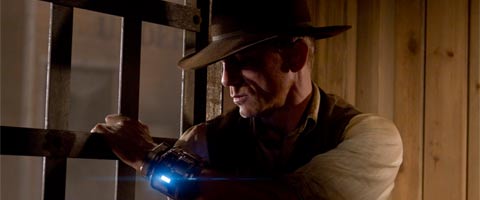
Not a lot of hot air balloons. Even just flying at all, that’s 35 years before the Wright brothers.
I’m sure the concept of it had gone through people’s minds. People have fallen off cliffs before, they were flying for a moment, but it’s not the same. [laughs] Douglas Adams’ books, they say: flying is just falling over and missing the ground. It was trying to keep it as real just as possible.
So how difficult was it to keep it real because I know Olivia was saying that there were football players dressed up with angry faces on tennis balls instead of aliens? So was it difficult to hold it together through this?
They can movie quick, Christ all mighty. Yes in a way, but no in another way. Because ultimately, you’re plugged to use your imagination as an actor and that’s part of the job and we laughed about it. You kind of have to see the absurdity of it, but you’re giving your faith over to some really technically brilliant people in Industrial Light and Magic, and having total faith that they are going to be able to make it real and you’ve got to give them the reactions. If you don’t give it to them, they’ve got nothing to work off. In spite of the fact we were giggling about it, we had to commit to it as well.
And when Jon was playing an alien?
Oh, did he play an alien?
She said he did.
He might well have done. He’s in the movie in little bits. I think he’s on a wanted poster in the jail.
Did you train with a dialect coach?
I had one on set with me all the time. And then I cut as many lines as I possibly could. [laughs] That was my main thrust on that.
Was it difficult for you to get the American accent?
The one thing that I wanted to do, I didn’t want to make it too kind of southern because I think it would’ve stood out. I wanted it, hopefully the idea is that people watching went “oh, he’s talking like that” and then forget about it, so that was the aim.
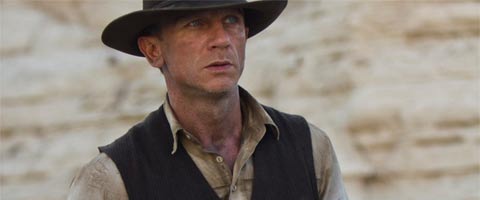
As a fan of western films, was there a particular staple that you really couldn’t wait to film or was really important for you to be in the movie?
Galloping across a prairie. I didn’t think Harrison Ford was going to be doing it next to me, but that’s one of the biggest thrills.
Could you expand a little bit on that, and working with Harrison Ford?
I’m a fan, and have been, as a lot of people are. But he’s an actor and I’ve been lucky enough to find with working with great actors is that they’re first and foremost all they want to do is get it right. He came powering in with lots of ideas, but also with humor and grace and all those things you’d hope in somebody, but you can’t expect. He wanted to take part in the movie. I’m like “fuck it” have as much as you want. [laughs] But across the board, I could talk about Harrison until the cows come home. [laughs] The cast: Olivia [Wilde] and Sam Rockwell, Adam [Beach] and Paul Dano – that’s Jon Favreau’s absolute attention was to gather as good a cast as we possibly could because it’s an extraordinary idea and we had to have the best actors we could, every part, Clancy Brown, everybody.
You talked about cutting lines and Jon had told us that the first script had your character have a lot more dialogue. How much did the character change once you were actually…
Quite a lot. I joke about cutting lines. Harrison says this as well, you don’t want characters explaining what’s going on. And more so probably in a cowboy movie than any other. You know, they don’t talk about “I don’t feel good about this.” It’s that. Getting that right is quite hard, but I had to rely on Jon to sort of be confident enough about the storytelling and you’re also appealing to the fastest member of the audience who’s already seen the end of the movie and kind-of is “oh I know what’s going to happen now.” So you want to keep some things back as long as possible. That was the plan, anyway.
What was more fun for you: the hand-to hand violence or…
Just the violence! [laughs]
Or the bigger stunt pieces?
I don’t know. The best one I had was just saddling up every day. I mean, it really was just that. Whether you came to work with a bad head or just in sort of a bad mood, getting on a horse was just sort of like: “Oh okay, here we go.” Everything’s got to calm down a little and it just, you know, you look up and we were in a beautiful countryside. I get a kick out of doing the action, I always have. It’s kind-of one of the reasons I wanted to become an actor was so I could fall over well, and so it sort of just gave me that opportunity.
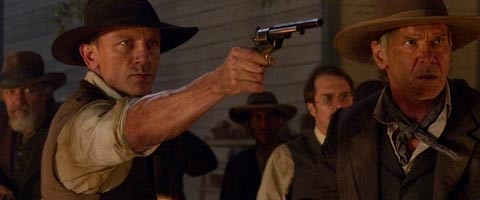
I noticed that your character keeps his hat with him throughout the whole film.
Can’t lose your hat. All the wranglers on the set, I lost my hat a couple of times, I had to buy a crate of beer every time I lost my hat. [laughs] So I glued that motherfucker to my head. [laughs]
But it was a real conscious effort. Like when you popped out of the water it was right there.
The best proponent of that art is the man sitting over there.
Jon said that there was a scene that you guys were going to do where both your hats fell off, and you were going to go for the wrong one and then Harrison goes: “No, that’s my hat.” [laughs]
We nearly did it. It’s too on-the-nose.
Olivia said she rode her whole life, had you? Or was this new?
Oh no. I had been involved with movies before that had no money to pay for horses or only on the day, so I kind-of ended up kind-of doing movies where I’d sort-of, as you ask every actor can they ride, they always say yes and I always say yea kinda. And they’d stick you on a horse, and you’d sort-of pretend and hope you don’t fall off, but I got the chance to ride a lot. I can’t talk how fantastic that was. It was just great to learn and realize actually I know nothing. Every day is kind-of a bit of a learning process. Harrison bought two horses, both my horse and his horse. If I had a patch of land, a patch of grass, I would have bought my horse.
As far as the tone of the movie, we talked a lot about getting really close to homage or taking elements from westerns and taking elements from science fiction and finding where they meet in the middle as well and kind-of the joke about the too-on-the-nose bit about the hats and that sort of thing. How did you keep it in the moment from becoming something that crossed that line?
Well, I think the title does it all. I think the title is the send up and then it was our job not to send it up. And we all agreed about that and that was certainly one of the reasons I did the job. We weren’t winking every time something happened. It’s a kind-of risk, but you have to go for it, when you make a movie, you have to take that risk. I think the easy way out is to make a gag every time something extraordinary happens. I think it’s funnier to get people reacting in a real way, like we were discussing, then it becomes funny because of situation as opposed to sort-of bullying the audience into laughing. It was funny, the first time I saw Blade Runner, I saw it double bill with Outland. And Outland is a western, it’s Sean Connery and people. They blend. They do blend and they always have. For Christ sake’s, Han Solo’s a cowboy.
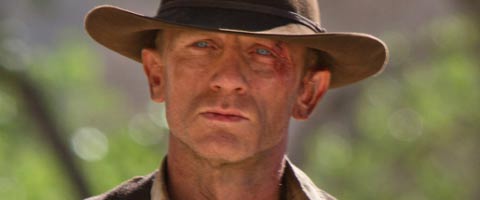
Was it hard to have a blaster around Han Solo and not make jokes?
That never stopped me. [laughs]
Oh please tell us one.
No I can’t, I can’t let secrets like that. I took advantage of all of those things. It was the only way I could stay sane working with him. [laughs]
Olivia said you didn’t like to have it called a bracelet.
Like I said, you should see the earrings. [laughs] That’s a Daniel Craig line. That will be on QVC before you can launch.
Can I ask you real quick, do you know when you’re starting to shoot your next Bond?
November.
This may be a little strange, but as far as having that other-worldly, piece of technology on your hand and talking about keeping it real. How do you as an actor learn what a real response to that would be? Like how do you take someone from the 19th century and try to put your head in that space?
You make shit up. [laughs] I mean, you don’t. You talk about it. That’s what you do.
But it does seem very naturalistic, I mean it does seem the way anyone would respond to it.
We rehearsed for a couple weeks, at least a couple weeks. I was working with Russell for about four weeks all-in-all. And then when we were filming it, it was constantly a question we were always asking ourselves: how do we keep it authentic? How do we keep it authentic? And that was just the aim. It’s just the way we sort-of make the movie. But joking aside, you make shit up.
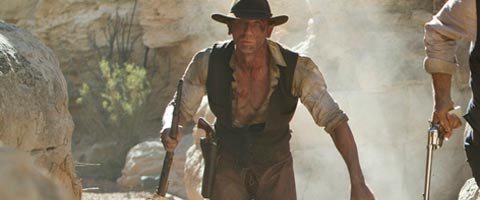
I found myself watching the movie and seeing how people from this different time period would respond shockingly similar to I think how we would respond to it because the alien’s technology is just so much more advanced.
The leap of faith is one of, I mean obviously, there’s something at the beginning of the movie that says these are demons and it’s kind of you know, I imagine you live in the wild west and it was heaven and hell and a dusty earth. And the fact is that they came along to something they immediately thought they were being punished for something and then take it to the next stage is how these people kind of suddenly go “Fuck this, we’re going to deal with it and we’re gonna go in fact, I’ve said it before but it does make sense, we’re going to head them off at the pass.” You know, literally, they’re going to get a posse together and go after the aliens cause they’ve taken our kin.
Did you learn any Apache?
No it’s hard. It’s a mouthful. I know Olivia did learn some and we had Adam on set. I mean, for me, there’s a couple of guys who are on it who play some of the bigger roles there got invited to a Sundance, which I didn’t make it to this year, but I will eventually. I mentioned before, Little Big Man is one of my favorite movies and the whole mystique of western life, but also the mystique of Native American life kind-of comes together in that clash and the tragedy about that. There’s always been a major fascination for me.
Can you explain a little bit about that as someone who is not from the United States like how that looks to you.
Well I suppose, I got the political westerns of the 70’s that were using Vietnam as a backdrop. And the fact is that it was, let’s be honest, it was a genocide that took place, there’s no real getting round it and a lot of that is kind-of fascinating. To my people as well.
Can you explain a little bit about that, as someone who is not from the United States like how that looks to you.
Well I suppose, I got the political westerns of the 70’s that were using Vietnam as a backdrop. And the fact is that it was, let’s be honest, it was a genocide that took place, there’s no real getting round it and a lot of that is kind-of fascinating. To my people as well. There's that Stephen Hawking quote, that came out while we were making the movie, if the aliens landed now it would be much like Columbus hitting the United States, it would have that as tectonic a movement on our society. That's interesting. And there's that great PBS documentary, How the West was Lost and Won which I recommend to anyone. It kind of filled in all the gaps for me.
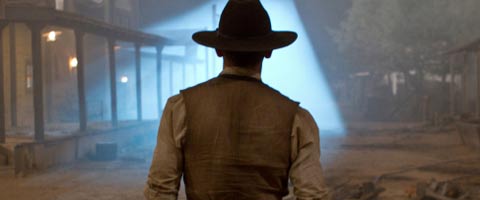
Do you think a creature or a space alien, obviously they're using it here as the last bastion of pure evil that we can just enjoy you fighting and killing, a lot. Is that something you're conscious of, you were talking about the political films of the 70s.
This one's called Cowboys & Aliens. Joking aside. We're trying to get this to as wide an audience as possible, this is not the movie to discuss or develop those ideas. But it's interesting, "why aliens?" After the war and during the nuclear age there's was a lot about aliens attacking, because it was this constant threat. There's whole thesis to write on this, and I'm sure you will. People have PHDs on this thing and address why we apply science fiction to culture, because there are other fears in our lives. But it's much easier and much more morally right to blast aliens than to blast each other.
Since you have this love of westerns, would you actively pursue another?
Yeah I think I would, maybe one without the aliens in it. They're amazing stories. There's always a major moral argument within a Western. There's life and death decisions, and therefore everything is heightened. Plus riding a horse, wearing a hat, and carrying a gun.
They're the prettiest movies too.
That's very true. And I said this earlier, but we didn't shoot this movie in 3D, and I'm so glad we didn't. I don't think 3D is ready to capture this kind of thing yet. It actually doesn't make sense, this works in 2D. We shot it anamorphically so there's as much wide screen spectacle as possible… The acting's 3D.

Eric Eisenberg is the Assistant Managing Editor at CinemaBlend. After graduating Boston University and earning a bachelor’s degree in journalism, he took a part-time job as a staff writer for CinemaBlend, and after six months was offered the opportunity to move to Los Angeles and take on a newly created West Coast Editor position. Over a decade later, he's continuing to advance his interests and expertise. In addition to conducting filmmaker interviews and contributing to the news and feature content of the site, Eric also oversees the Movie Reviews section, writes the the weekend box office report (published Sundays), and is the site's resident Stephen King expert. He has two King-related columns.
